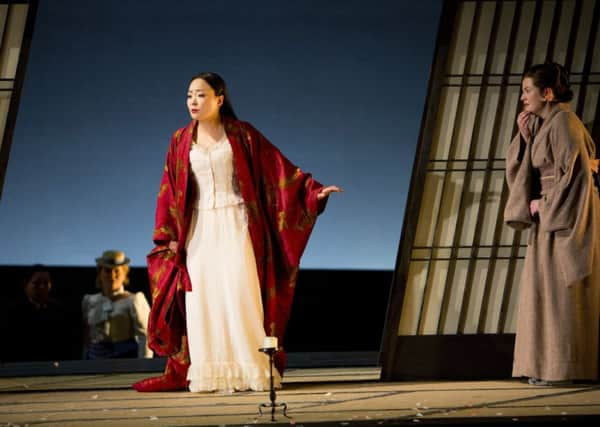Classical: Scottish Opera’s new season


Following harsh criticism of its artistic planning – particularly over the paucity of main stage productions in recent years, the perceived imbalance between artistic and administrative staff, the parting of company with Emmanuel Joel-Hornak only weeks after he started as music director last summer, and now the late completion of the Theatre Royal extension – Scottish Opera was keen this week to present a positive spin on the launch of its new 2014-15 season.
Well, the good news is that the number of main productions is up from last year’s poor showing of three, and that the five on offer for 2014-15 are not only fine examples of the species, but four of them are new productions featuring intriguing directorial partnerships.
Advertisement
Hide AdThe season opens in October with Rossini’s La Cenerentola, a partnership with Opera National du Rhin, the company that premiered Sandrine Anglade’s new production last October, and which Scottish Opera general director Alex Reedijk describes as “an interesting vision that isn’t at all chocolate box”.
More intriguing, perhaps, is the prospect of former Scottish Ballet supremo Ashley Page’s return to the Scottish stage to direct a new production of Gluck’s Orfeo ed Euridice. It isn’t the first time a ballet director has stamped his mark on Gluck’s most famous opera – choreography team Emio Greco and Pieter C Scholten did so in Opera North’s illuminating production ten years ago at the Edinburgh Festival – but Page’s brief, says Reedijk, is “to think about bringing it into the 21st century”.
Elsewhere in the season, there’s a co-production with Danish National Opera of Janacek’s Jenufa, directed by Annilese Maskimmon, and a revival of Peter Watson’s dark 2001 production of Verdi’s Il trovatore, featuring singers Roland Wood, Claire Rutter and Matthew Best, and conducted Tobias Ringborg.
But the surprise element is a brand new production of James MacMillan’s Inés de Castro, the Scots composer’s first major opera, commissioned by Scottish Opera in 1996 and premiered at that year’s Edinburgh Festival. Planning for this came late in the day, but Reedijk believes the time is right to bring it back into the repertoire.
“If you’re thinking where we are in 2014, it’s probably the most important Scottish opera to have come out of Scotland,” Reedijk suggests. “I just wondered what it would be like to revisit it in a context where it is very much a heretical drama. It’s about women, suffering and all the tensions that go with conflict, and it was written at the time of the end of the Balkan war. Nearly 20 years on, and you’ve got all the stuff going on very live in Kiev, and in Nigeria. It’s a good time to revisit it.”
It has also given MacMillan – who will conduct all four performances – the opportunity he has long wished for to make some changes to the score.
Advertisement
Hide AdBut why the need for a new production? Putting aside wicked rumours that Scottish Opera has actually mislaid the original set, Reedijk reckons that “because the world has moved on so much since Jimmy wrote the work, and when it was set, I thought it was right just to put a new production together.” Olivia Fuchs has been drafted in to direct it.
But was there never any consideration given to performing MacMillan’s other major opera instead? After all, The Sacrifice – commissioned and premiered in 2007 by Welsh National Opera – has never been performed in his native Scotland, and is surely due an airing. “It’s too big a piece for us to bring to Scotland and it’s had a very good airing around a lot of the UK,” says Reedijk. Yet, according to MacMillan’s publishers, there’s not a lot of difference between the two in that sense.
Advertisement
Hide AdSo there we have it. Five significant productions revolving around the vast tapestry of small-scale outreach and development work that constitutes a year in the life of Scottish Opera – ranging from a new family opera Anamchara by author Alexander McCall Smith and composer Pippa Murphy, performed during the Commonwealth Games by the children of Scottish Opera Connect Orchestra and Chorus, to the continuing travels of the small-scale Verdi’s Macbeth, to the usual Opera Highlights Tour and operas for the very young.
But is that enough to silence Scottish Opera’s critics? On the matter of main stage productions, will this year’s five simply prove to be a knee-jerk reaction? “I can’t guarantee we’ll have five the following season,” admits Reedijk. “I reckon we’ll be operating around four or five each season.”
And the search for a musical director? What exactly is the role of singer-turned-stage director Sir Thomas Allen, who’s been brought in as interim music adviser? ”We’re on the journey to find a musical director, and these things take a minute or two, I wanted someone meantime we could turn to to say ‘here’s a conductor that’s come to our attention; here’s a singer the team have got in mind to be cast in various roles; what do you think?’”, Reedijk explains. Just what Allen’s form – he’s not a conductor – is in that area of recruitment remains to be seen.
As for the perceived preponderance of marketing and backroom, compared to diminished artistic staff, it’s clear from the current production of Madama Butterfly that not having a regular staff chorus has had a major impact on performance standards – the singing last week was shaky and thin. Reedijk remains firm. “I think the model we have is pretty good.”
And will the delayed opening of the Theatre Royal extension happen in time for the Commonwealth Games premiere of Anamchara on 25 July? “Yes, that will be open in time,” says Reedijk. There’s optimism for you.
• www.scottishopera.org.uk